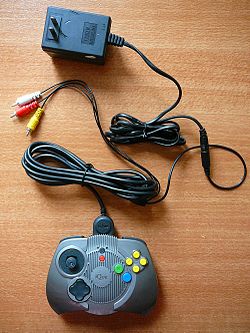- iQue Player
-
This article is about the home console. For other iQue products, see iQue. For other uses, see iQue (disambiguation).
iQue Player 
Developer Nintendo Manufacturer iQue Generation sixth generation era Release date CN November 17, 2003 Introductory price ¥498 Media Flash card, cartridge CPU R-4300 64Bit CPU, 93.75 MHz Memory 4 MB Online services iQue Depot, Fugue Online[1] Related articles Nintendo 64 The iQue Player (/ˌaɪ ˈkju/) is a video game console that was manufactured by iQue, a joint venture between Nintendo and Chinese-American scientist Dr. Wei Yen. The system also goes under the Chinese name of Shén Yóu Ji (神游机), literally "Divine Gaming Machine". Shényóu (神游) also serves a double entendre because the term also means "to make a mental journey". The console itself takes the form of the controller and plugs directly into the television. A box accessory is available that allows multiplayer gaming.[2] At the moment, it is only marketed in mainland China, as the console's unusual game distribution method is an attempt to curb games piracy in that region.
The iQue Player was first announced at the 2003 Tokyo Game Show, and it was released in mainland China on November 17, 2003. A Japanese release was rumored for mid-October 2004, but never materialized. Nintendo currently has no plans to release the iQue Player outside of China.
Games for this console are stored on a 64 MB flash card which is contained within a cartridge that plugs directly into controller/console. Games are purchased at a special "iQue depot" where games may be downloaded onto the cartridge and played later, in a similar manner to the Famicom Disk System. Demo games that come with the iQue include The Legend of Zelda: Ocarina of Time, Super Mario 64, and Star Fox 64. These demos are time-limited versions of the games. Full versions of the three titles are available, as are other first party Nintendo titles such as Dr. Mario 64, Mario Kart 64, Wave Race 64, and F-Zero X.
Contents
Technical details
The iQue Player is based on the Nintendo 64, but uses system-on-a-chip technology to reduce size. It plays Nintendo 64 games specifically ported to the system.
- Processor: R-4300 64Bit CPU, 93.75 MHz
- Memory: 4 Mb RAMBUS
- Graphics: 100,000 polygons/second, 2.09 million colors
- Sound: ADPCM 64
Online Services
iQue has online services for buying games, cloud storage, game updates, etc. Currently, there are two online services for the iQue Player one is kiosk based, another is broadband based.
iQue Depot
The iQue depot is a network of kiosk that allows users to download games, update the games, and more. Players can also store their games on the iQue Depot network for free. They're mostly seen at gas stations in China. Users must be a member of the iQue Club to download games.
Fugue Online
Fugue online is an online service that allows users to get free access to games at home, update their system and more. Plans are said to make online mutiplayer and communication possible in the near future.[1]
Successor
After 8 years, a successor to the iQue player has been speculated. Though no successor has been announce, Nintendo has plans to release the Wii in China. Most likely a successor would be based on the Gamecube or Wii.
Games
Original title in English Chinese (Simplified) Pinyin Wave Race 64 水上摩托 Shuǐ Shàng Mótuō[3] Star Fox 64 星际火狐 Xingjì Huohu [4] Super Mario 64 神游马力欧 Shén Yóu Mǎlìōu[5] The Legend of Zelda: Ocarina of Time 塞尔达传说-时光之笛- Sèěrdá Chuánshuō: Shíguāng zhī Dí[6] Mario Kart 64 马力欧卡丁车 Mǎlìōu Kǎdīngchē[7] F-Zero X F-Zero X 未来赛车 F-Zero X Wèilái Sàichē[8] Yoshi's Story 耀西故事 Yàoxī Gùshi[9] Paper Mario 纸片马力欧 Zhǐ Piān Mǎlìōu[10] Sin and Punishment: Successor of the Earth 罪与罚-地球的继承者- Zuì yǔ Fá: Dìqiú de Jìchéng Zhě[11] Excitebike 64 越野摩托 Yuèyě Mótuō[12] Super Smash Bros. 任天堂明星大乱斗 Rèntiāntáng Míngxīng Dà Luàn Dǒu[13] Dobutsu no Mori 动物森林 Dòngwù Sēnlín[14] Dr. Mario 64 马力欧医生 Mǎlìōu Yīshēng[15] Custom Robo 组合机器人 Zǔhé Jīqìrén[16] References
External links
- iQue PLAYER website (Chinese)
Categories:- Nintendo consoles
- Sixth-generation video game consoles
- 2003 introductions
- Nintendo hardware
- Online gaming services
Wikimedia Foundation. 2010.
